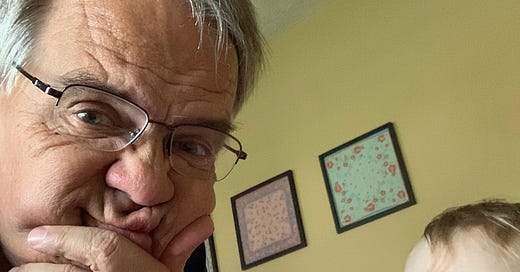Hi!
This is the free version of “Finding Words in Hard Times.” Which means it’s the only version. I’m committed to have a place with stories and tools to help you be more comfortable as you help others in hard times.
Sometimes, I hear from people with specific questions about what to say or do. I try to be as helpful as I can. I often point to things I’ve written. Sometimes, though, I haven’t written about it yet.
I got an email from a reader recently asking about how to be helpful when family members, near death, haven’t resolved conflicts.
As you know if you’ve been reading here for long, my approach is to say, “try this, it may be helpful.” I don’t know details of particular situations. And so, at best, I can suggest frameworks for thinking.
So I suggested some things to think about.
+++
Thanks for asking!
A few months back, as chaplains, we were working to figure out some next-of-kin things and who was going to make medical decisions and stuff. It was a difficult situation, and I'd spent some time on and off the job thinking about it. And then I realized that the person had, in fact, made some decisions about who they were and were not going to stay connected with years before they arrived at the hospital.
I realized that their choices to disconnect didn't have to become my burden to fix. I could be helpful, but I didn't have to own it. I could be sad at one level, but I didn't have to make it right. That was pretty freeing. (And only took me decades of working with people to figure out).
It's possible that a person has reconciled with the idea of not being reconciled.
If I understand, we're talking about parent in their nineties and sibling offspring who are at least in their late sixties? So everyone is adult? And may not have a core value of forgiveness?
You know, if you have nothing to lose, you could say to the parent, "You and I both value being honest. And you and I can both be cranky. And my job is to make sure people don't have regrets when they get around to dying. Like not going sky-diving. Or not having last words with people. Or not getting or giving apologies. So I need to ask you: Are there any regrets like that I can help you with?"
Maybe not that blunt, depending on your relationship, but probably that clear. And then go from there. But you would have done what you could.Because that's our challenge, right? To do what we can? Not to fix things, not to take on what isn't ours and not to abandon what is ours, but to do what we can.
And if one person in the family is the one driving process of regret and reconciliation, a conversation about why it matters so much to that person may be in order.
Recently, a friend was deciding whether or not to travel several hundred miles for the funeral of a family member. My friend had visited recently, and the situation had been complicated for decades. I said, “I give you permission to not go.” Sometimes the most helpful thing we can offer is permission to let go of unhealthy expectations.
You already know all this. Relationships are hard. But God is gracious, holds us close, and doesn't expect us to do what people aren't willing to let him do.
Does any of this make sense?
Thanks for asking.
May God give you wisdom.
Jon
+++
This week, my friend Dr. Lee Warren released his newest book, Hope is the First Dose: A Treatment Plan for Recovering from Trauma, Tragedy, and Other Massive Things. This book brings resolution to a journey of doubt and faith he started in the surgical tents at Joint Base Balad, Iraq. (I’ll write more about this on Friday at 300wordsaday.com)
Lee and I had a great conversation recently about helping people in times of grief.
We talked how infant loss is both the death of a person and of expectations. We talked about how things can be true, but may not be timely in the seconds, minutes, hours, days, weeks, months, and years after a loss. We talked about how different personalities respond to loss differently. We talked about ways that some of the things we’ve been taught about God aren’t helpful in times of loss. And we connected some of the conversation to Lee’s new book.
I loved the opportunity to think through some of these things in conversation. I’m not going to suggest that you will enjoy the conversation, but if the ideas in this preview resonate, I think that you may find it helpful. Hope Talks.
+++
Thanks for your support and engagement.
Jon






I like the part about taking the burden off of me. Realizing it may be someone else’s responsibility. If I find myself playing invincible, o wonder I am overwhelmed.
Jon, I so appreciate your deep thinking and sharing of the same with us to consider.
Your mini book titled “This is Hard” has been most helpful to myself as well as all of our Stephen Ministry team at The Chapel.
You are a must read for me.
Thank you!